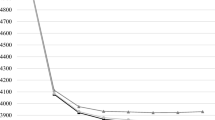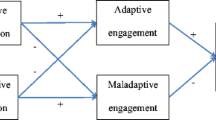Abstract
Student engagement has emerged as a crucial factor in higher education, playing a vital role in sha** the overall quality of learning outcomes. It refers to the active involvement and participation of students in specific activities that research has consistently linked to improved academic achievements. The pervasiveness of the term ‘student engagement’ has significantly shaped the higher education landscape, reinforcing its importance in fostering effective learning environments. In the realm of higher education, educators are continuously exploring diverse pedagogical approaches to enhance student engagement through active learning. This study focuses on the problem-solving learning model and its implementation to foster a deeper understanding of student engagement, including their positive behaviour, participation in activities, and cognitive capabilities. In this study, a quasi-experimental design was employed, incorporating pre-test, post-test, and non-equivalent control group elements. This specific design was chosen due to the constraints of randomly assigning students to groups. Instead, intact classes were randomly selected and assigned to either the control or experimental groups. The sample study was 476 higher secondary-level chemistry students collected from different higher secondary schools. A multi-stage sampling technique was used to select schools from the target population. Initially, schools were selected using a purposive sampling technique, focusing on those with fully equipped chemistry laboratories and qualified chemistry teachers. Additionally, consideration was given to including both female and male students in co-educational chemistry classes, as gender was considered a relevant variable for the study. This study adopts a quasi-experimental design, utilizing an achievement and retention test in chemistry as its primary instrument. The validity of this instrument was ensured through face validation by three expert evaluators. To eliminate the errors of non-equivalence arising from the non-randomization of the research subjects, the analysis of covariance (ANOVA) was used in analysing the data and to remove the error of initial differences in ability levels among the research subjects. The findings of the study demonstrated that students in the experimental group experienced a notable increase in problem-solving success compared to their counterparts in the control group, a difference that became evident right from the first intervention. This study establishes a positive correlation between student engagement and their learning outcomes, indicating that higher engagement leads to better academic performance. Additionally, it observes that the correlation between boys’ and girls’ problem-solving skills and their learning outcomes is comparatively weaker, suggesting potential variations in how problem-solving abilities impact academic achievement among genders. It also reveals that there is a positive influence on student engagement and problem-solving skills in students’ academic achievement. Despite the challenges encountered, the results demonstrated the vital role of the problem-solving learning model, when coupled with student engagement, in fostering students’ critical thinking skills concerning reaction rate material. These instructional practices were observed to foster higher levels of student engagement, ultimately resulting in enhanced academic achievement among students.





Similar content being viewed by others
Data Availability
Data sharing does not apply to this article as no datasets were generated or analysed during the current study.
References
Adeyeye, B., Ojih, S. E., Bello, D., Adesina, E., Yartey, D., Ben-Enukora, C., & Adeyeye, Q. (2022). Online learning platforms and Covenant University students’ academic performance in practical related courses during COVID-19 pandemic. Sustainability, 14(2), 878.
Allah, A. A. I. H., & Hewary, O. A. A. (2023, March). The Effectiveness of Using Mobile Phone Applications in Virtual Laboratories On Academic Achievement in Chemistry for Students of the Department of Chemistry College of Education Omdurman Islamic University. In Proceeding of International Conference On Education, Society and Humanity (Vol. 1, pp. 59–71).
Aquino, J. E., & Bautista, R. G. (2022). CHEMIKA and Students’ Academic Achievement in Chemistry. American Journal of Educational Research, 10(8), 501–507.
Asvio, N. (2022). The influence of learning motivation and learning environment on undergraduate students’ learning achievement of management of islamic education, study program of IAIN Batusangkar in 2016.
Ayyıldız, Y., Tarhan, L., & Gil, A. (2022). Comparing the effectiveness of the learning material and the learning method in students’ achievement in chemistry lesson on chemical changes. Research in Science & Technological Education, 1–22.
Banda, H. J., & Nzabahimana, J. (2023). The impact of physics education technology (PhET) interactive simulation-based learning on motivation and academic achievement among malawian physics students. Journal of Science Education and Technology, 32(1), 127–141.
da Silva Júnior, J. N., Castro, G. D. L., Melo Leite Junior, A. J., Monteiro, A. J., & Alexandre, F. S. O. (2022). Gamification of an entire introductory organic chemistry course: A strategy to enhance the students’ engagement. Journal of Chemical Education, 99(2), 678–687.
Foong, C. C., Liew, P. Y., & Lye, A. J. (2022). Changes in motivation and its relationship with academic performance among first-year chemical engineering students. Education for Chemical Engineers, 38, 70–77.
Huang, Y. M., Silitonga, L. M., & Wu, T. T. (2022). Applying a business simulation game in a flipped classroom to enhance engagement, learning achievement, and higher-order thinking skills. Computers & Education, 183, 104494.
Kanwal, W., Qamar, A. M., Nadeem, H. A., Khan, S. A., & Siddique, M. (2022). Effect of conceptual understanding of Mathematical Principles on academic achievement of secondary Level Chemistry Students. Multicultural Education, 8(3), 242–254.
Lee, K. S., Rix, B., & Spivey, M. Z. (2023). Predictions of success in organic chemistry based on a mathematics skills test and academic achievement. Chemistry Education Research and Practice, 24(1), 176–191.
Munene, T. S., Mutsotso, S. N., & Masibo, E. N. (2023). Integration of Information Communication Technology Instructional Resources on students’ motivation and achievement in Chemistry practical in secondary schools in Kenya. Journal of Education and Practice, 7(1), 12–39.
Naibert, N., & Barbera, J. (2022). Investigating Student Engagement in General Chemistry active learning activities using the activity Engagement Survey (AcES). Journal of Chemical Education, 99(7), 2620–2629.
Naibert, N., Vaughan, E. B., Brevick, K., & Barbera, J. (2022). Exploring student perceptions of behavioral, cognitive, and Emotional Engagement at the activity level in General Chemistry. Journal of Chemical Education, 99(3), 1358–1367.
Nofrialdi, R. (2022). The Effect of Student’S Creativity and Learning Interest on Learning Achievement in Economic Students Class ** Ips SMA Ekasakti Padang. Journal International on Global Education, 1(1), 37–46.
Nzomo, C., Rugano, P., Njoroge, M., & Gitonga, C. (2023). Inquiry-based learning and students’ self-efficacy in chemistry among secondary schools in Kenya. Heliyon, e12672.
Onah, K. T. (2022). Effect of scaffolding teaching approach on students’ academic achievement in Quantum Physics in Enugu Education Zone. Greener Journal of Educational Research, 12(1), 13–21.
Onah, K. T., & Anamezie, R. C. (2022). Academic interest as predictor of academic achievement of secondary School Physics Students. African Journal of Science Technology and Mathematics Education, 8(4), 320–326.
Paristiowati, M., Rahmawati, Y., Fitriani, E., Satrio, J. A., & Putri Hasibuan, N. A. (2022). Develo** preservice chemistry teachers’ engagement with sustainability education through an online project-based learning summer course program. Sustainability, 14(3), 1783.
Rahmawati, Y., Taylor, E., Taylor, P. C., Ridwan, A., & Mardiah, A. (2022). Students’ engagement in education as sustainability: Implementing an ethical dilemma-STEAM teaching model in chemistry learning. Sustainability, 14(6), 3554.
Tempelman, C. H., Rijgersberg, A., & van der Eijk, M. (2023). Introducing theory in practice: The Beneficiary Effects of Teaching Chemistry in the Laboratory on Student Success. Journal of Chemical Education.
van Dulmen, T. H., Visser, T. C., Pepin, B., & McKenney, S. (2022). Teacher and student engagement when using learning materials based on the context of cutting-edge chemistry research. Research in Science & Technological Education, 1–22.
Wang, Y., **a, M., Guo, W., Xu, F., & Zhao, Y. (2022). Academic performance under COVID-19: The role of online learning readiness and emotional competence. Current Psychology, 1–14.
Yağcı, M. (2022). Educational data mining: Prediction of students’ academic performance using machine learning algorithms. Smart Learning Environments, 9(1), 11.
Zhang, L., Carter Jr, R. A., Qian, X., Yang, S., Rujimora, J., & Wen, S. (2022). Academia’s responses to crisis: A bibliometric analysis of literature on online learning in higher education during COVID-19. British Journal of Educational Technology, 53(3), 620–646.
Funding
Not Applicable.
Author information
Authors and Affiliations
Corresponding author
Ethics declarations
Conflict of interest
The authors declare that they have no Conflict of Interest.
Additional information
Publisher’s Note
Springer Nature remains neutral with regard to jurisdictional claims in published maps and institutional affiliations.
Rights and permissions
Springer Nature or its licensor (e.g. a society or other partner) holds exclusive rights to this article under a publishing agreement with the author(s) or other rightsholder(s); author self-archiving of the accepted manuscript version of this article is solely governed by the terms of such publishing agreement and applicable law.
About this article
Cite this article
E., S., Benjamin, A.E.W. Studying the student’s perceptions of engagement and problem-solving skills for academic achievement in chemistry at the higher secondary level. Educ Inf Technol 29, 8347–8368 (2024). https://doi.org/10.1007/s10639-023-12165-x
Received:
Accepted:
Published:
Issue Date:
DOI: https://doi.org/10.1007/s10639-023-12165-x




